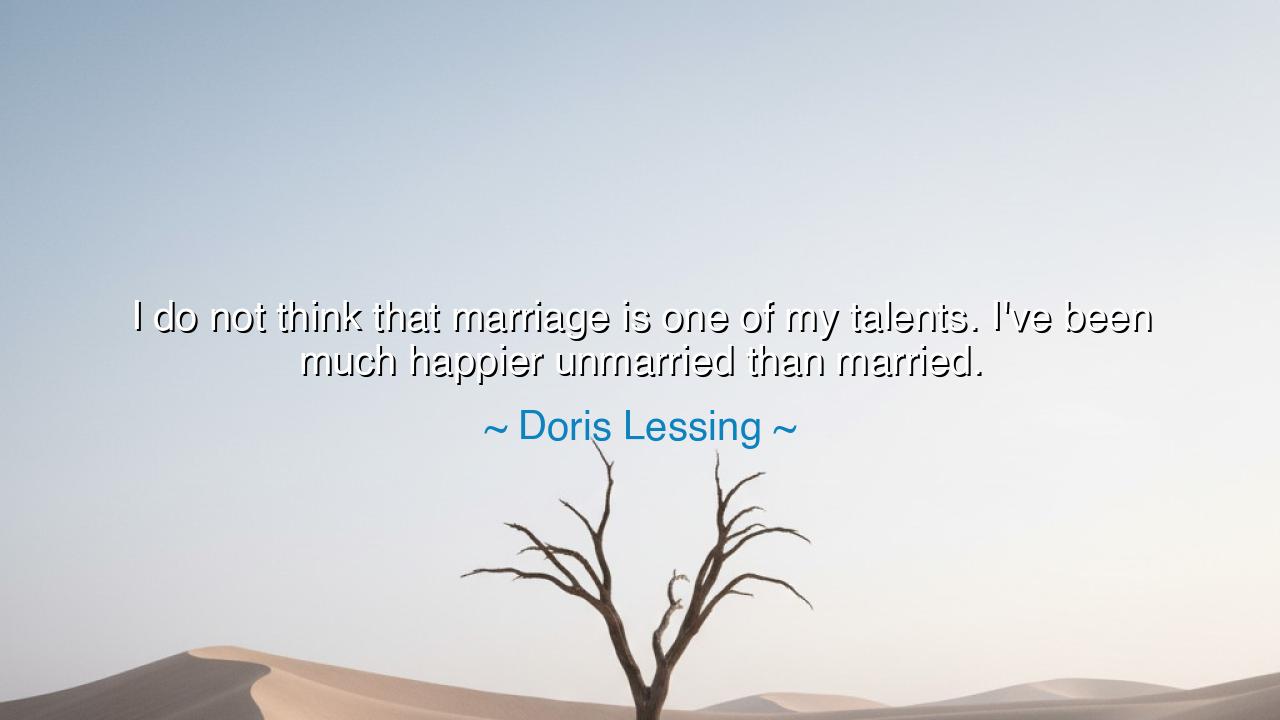
I do not think that marriage is one of my talents. I've been much
I do not think that marriage is one of my talents. I've been much happier unmarried than married.






In the words of Doris Lessing, the fearless chronicler of human truth, we find a confession that is both personal and universal: “I do not think that marriage is one of my talents. I’ve been much happier unmarried than married.” These words are neither cynical nor bitter—they are the calm and luminous reflection of a soul that has walked through love, loss, and independence, and has returned with wisdom in her hands. For Lessing, the great novelist of freedom and self-knowledge, did not speak as one who rejected love, but as one who had discovered that happiness, for some, blooms not in partnership, but in solitude.
To understand the meaning of this quote, we must remember that marriage, in the time of Doris Lessing, was still regarded as both a destiny and a duty for women. To be unmarried was to stand outside the circle of approval; it was to live without the protection of a name, and to bear the whispers of convention. Yet Lessing, ever the rebel spirit, saw through these illusions. She understood that not every soul is fashioned for the same form of life, that what nourishes one may suffocate another. In declaring that marriage was “not one of her talents,” she spoke as a craftsman of the self—one who had measured her spirit and found that it could not thrive within the traditional walls of wifely expectation.
There is a quiet courage in her words, for they defy the myth that fulfillment must come from union. Lessing teaches that to be whole, one must first be free—that love, if it is to be pure, must come not from need, but from strength. Too often, people enter marriage to escape loneliness or to complete themselves, forgetting that two half-lives do not make a whole. But Lessing’s life, filled with literature, intellect, and contemplation, was proof that solitude can be fertile ground for creation. Her art and her insight grew not from dependence, but from the deep well of self-understanding that can only be found in independence.
History has seen other spirits who echoed this truth. Think of Virginia Woolf, who once wrote that a woman must have “a room of her own” if she is to create. She too knew that the mind’s freedom often demands a measure of physical solitude. Or Diogenes, the ancient philosopher who lived in a barrel and mocked the comforts of domestic life, saying that only the free man can think clearly. These souls, like Lessing, were not enemies of love—they were seekers of authenticity. They understood that some natures are not built for the compromises of partnership, that their highest calling lies not in the shared hearth, but in the boundless sky of thought and creation.
Yet Lessing’s confession is not without tenderness. When she says she was “much happier unmarried than married,” she does not condemn marriage itself, but speaks of her own temperament—of the truth that self-knowledge is the first step toward peace. Many are unhappy not because they lack love, but because they pursue the wrong kind of love, chasing an ideal that does not fit the shape of their being. Lessing’s wisdom is that happiness cannot be found by imitation; it must be discovered through the honest examination of one’s own soul. To live by another’s design is to betray oneself; to live by one’s own truth is to honor the divine spark within.
The lesson her words offer is clear: do not mistake solitude for failure, nor marriage for success. Every path is sacred if it leads to authenticity. Some hearts are meant to be shared; others are meant to wander freely, gathering beauty from the world. The true test is not whether one is married or unmarried, but whether one is whole—whether one lives in accordance with the nature that the gods have given. Happiness is not the gift of another person; it is the reward of living in harmony with oneself.
Therefore, my friends, let Lessing’s words be both comfort and challenge. Do not fear to stand alone if that is where peace finds you. Do not cling to union if it diminishes your spirit. The world is filled with voices that demand conformity—but your task is to listen to the still, small voice within. As the ancients taught, “Know thyself,” for in that knowing lies all freedom. If you discover, like Doris Lessing, that solitude is your truest companion, embrace it not as isolation but as sovereignty—the quiet kingdom of the self, where joy is not borrowed but born anew each day.






AAdministratorAdministrator
Welcome, honored guests. Please leave a comment, we will respond soon